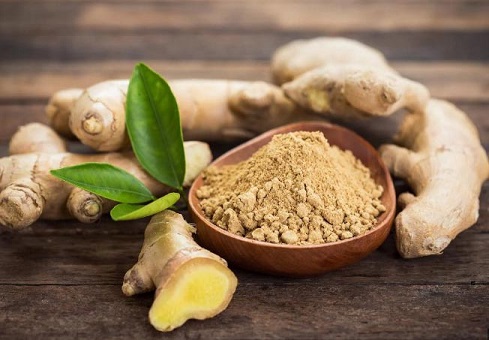Nikhil Prasad Fact checked by:Thailand Medical News Team Aug 04, 2024 1 year, 6 months, 3 weeks, 1 day, 23 hours, 15 minutes ago
Anti-Aging News: Researchers from Multiple Institutions Unveil the Health Benefits of Ginger
A recent comprehensive review conducted by an international team of researchers has highlighted the promising health benefits of ginger (Zingiber officinale) in combating age-related disorders and promoting longevity. This
Anti-Aging News report delves into the extensive research findings that demonstrate ginger's potential to address the hallmarks of aging. Researchers from the Institute of Genetics and Animal Biotechnology of the Polish Academy of Sciences, Kumaun University in India, McMaster University in Canada, the Bulgarian Academy of Sciences, East West University in Bangladesh, Saveetha Institute of Medical and Technical Sciences in India, and the Medical University of Vienna have collectively contributed to this enlightening study.
 Ginger-the natural elixir for longevity and anti-aging
The Hallmarks of Aging and Ginger's Impact
Ginger-the natural elixir for longevity and anti-aging
The Hallmarks of Aging and Ginger's Impact
Aging is characterized by the gradual decline of physiological functions and homeostasis, leading to increased susceptibility to various neoplastic and degenerative diseases. The twelve prominent hallmarks of aging include genomic instability, telomere attrition, epigenetic alterations, loss of proteostasis, disabled macroautophagy, deregulated nutrient-sensing, mitochondrial dysfunction, cellular senescence, stem cell exhaustion, altered intercellular communication, chronic inflammation, and dysbiosis. This study examines how ginger and its bioactive constituents positively influence these hallmarks.
Genomic Instability
Genomic instability is a major contributor to aging, involving diverse genetic lesions such as point mutations, DNA breaks, and telomere shortening. Ginger, known for its antioxidant and free radical scavenging properties, has been shown to counteract DNA damage induced by oxidative stress. Studies have demonstrated that compounds like 6-gingerol and 6-shogaol significantly enhance antioxidant defense mechanisms, thereby protecting against genomic instability.
Telomere Attrition
Telomeres, the protective caps at the ends of chromosomes, shorten with each cell division, leading to cellular aging and death. Research indicates that ginger's antioxidant properties can mitigate telomere shortening by reducing oxidative stress. For instance, a diet rich in antioxidants, including those found in ginger, has been shown to maintain telomere length and reduce the risk of age-related diseases.
Epigenetic Alterations
Epigenetic modifications, such as DNA methylation and histone acetylation, play a crucial role in gene expression and aging. Studies have shown that ginger and its constituents, like 6-shogaol, can modulate epigenetic mechanisms, thereby promoting genomic stability and preventing age-related diseases. For example, ginger extract has been found to restore the expression of tumor suppressive miRNAs in breast cancer cells, indicating its potential in cancer prevention.
Loss o
f Proteostasis
Proteostasis, the maintenance of protein homeostasis, is vital for cellular health. Aging disrupts proteostasis, leading to the accumulation of damaged proteins. Ginger has shown promise in enhancing proteostasis, particularly in neurodegenerative diseases like Alzheimer's and Parkinson's. Research has demonstrated that ginger can reduce amyloid plaques in Alzheimer's models and protect dopaminergic neurons in Parkinson's models.
Disabled Macroautophagy
Macroautophagy, the process of degrading and recycling cellular components, declines with age. Ginger has been shown to stimulate autophagy, thereby improving cellular homeostasis. Studies have highlighted that gingerol-enriched ginger extract can induce autophagy, enhancing glucose tolerance and pancreatic insulin content in diabetic rats. Additionally, 6-gingerol has been found to promote autophagy in endothelial cells, potentially preventing atherosclerosis.
Deregulated Nutrient-Sensing
Nutrient-sensing pathways, including insulin/IGF-1 signaling and mTOR, play a critical role in aging. Ginger has been shown to modulate these pathways, promoting longevity. Research on Caenorhabditis elegans revealed that ginger extract could extend lifespan by modulating insulin/IGF-1 signaling. Moreover, ginger has been found to inhibit mTOR activation, reducing fat accumulation and promoting healthspan.
Mitochondrial Dysfunction
Mitochondrial dysfunction is a hallmark of aging, contributing to various age-related diseases. Ginger has demonstrated the ability to improve mitochondrial function and biogenesis. Studies have shown that ginger extract can enhance mitochondrial size, DNA content, and ATP production, thereby improving cellular energy metabolism.
Cellular Senescence and Stem Cell Exhaustion
Ginger has also shown potential in modulating cellular senescence and stem cell exhaustion. Research indicates that compounds like 6-gingerol can enhance the expression of longevity-related genes, thereby improving the regenerative capacity of cells.
Chronic Inflammation and Dysbiosis
Chronic inflammation and dysbiosis (imbalance of gut microbiota) are significant contributors to aging. Ginger's anti-inflammatory properties have been well-documented, with studies showing its ability to inhibit pro-inflammatory pathways and reduce oxidative stress. Additionally, ginger has been found to modulate gut microbiota, increasing the abundance of beneficial bacteria and reducing pathogenic species.
Conclusion
The collective research underscores ginger's potential as a powerful natural remedy for promoting longevity and combating age-related disorders. By targeting the hallmarks of aging, ginger can significantly improve healthspan and lifespan. However, more clinical trials are needed to validate these findings in humans.
The study findings were published in the peer-reviewed journal: Biomolecules.
https://www.mdpi.com/2218-273X/14/8/940
For the latest
Anti-Aging News, keep on logging to Thailand Medical News.
Read Also:
https://www.thailandmedical.news/news/herbs-and-phytochemicals-study-shows-that-zingerone-and-shogoal-from-ginger-can-inhibit-sars-cov-2
https://www.thailandmedical.news/news/university-of-colorado-study-shows-that-ginger-supplementation-helps-in-autoimmune-diseases-as-it-suppresses-neutrophil-extracellular-trap-formation
